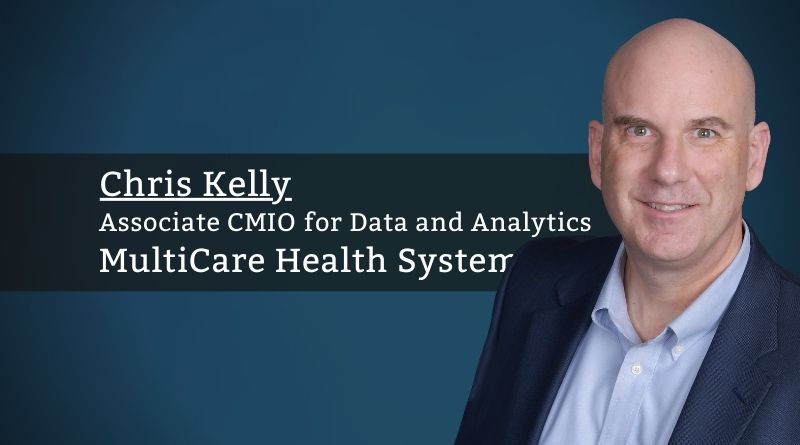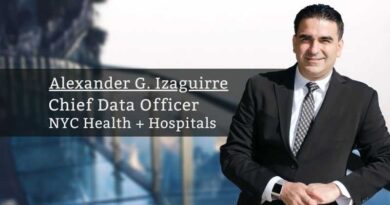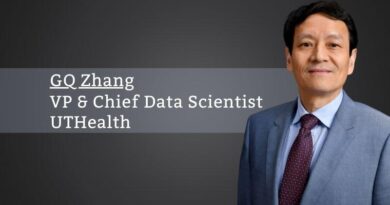The Case for the Healthcare Data Scientist
By Chris Kelly, Associate CMIO for Data and Analytics, MultiCare Health System
No one in healthcare will forget March 2020, staring down the worst pandemic in living memory. Society shut down. People started dying at unheard-of rates in Italy, and shortly later NY City. MultiCare Health Systems, an 11-hospital healthcare system in the Pacific Northwest, near where the first US cases were reported, needed to know what to expect.
The data science team at MultiCare addressed the problem by modeling case increases in the communities we serve, first with exponential growth models, but within two weeks, we realized logistic (S-shaped) growth models fit the data better. We were not hit hard in that first wave, and we have continued to model Covid cases across our system through subsequent waves, giving advance notice of a surge and providing our leaders with data-driven insights.
The future of healthcare is big data. But big data by itself just sits in an enterprise data warehouse and runs up storage fees. Healthcare data scientists are essential in moving beyond reports and static dashboards. Data needs to be turned into actionable intelligence for a healthcare system to benefit.
Healthcare data scientists can help an organization get the greatest return on their data infrastructure investment.
Endless Opportunity. The problems that can be addressed with data science are essentially endless. Will a patient be readmitted after discharge? Which patients will have a prolonged hospital course? Can we identify those patients who will develop sepsis earlier and start lifesaving treatment sooner? These problems are readily amenable to predictive modeling and are already commonly deployed in hospitals across the country.
This is just the leading edge of what predictive modeling can do. Many systems are large enough to provide comprehensive datasets on a wide range of patients and conditions. Each disease can be approached using predictive modeling. For many common ailments, a patient’s journey can be mapped along a pathway, with each node in the pathway representing a decision point. It is not hard to imagine a future where dozens, even hundreds of pathways guide a patient’s care, with each downstream step in the journey modeled, and the optimal course of action presented for each individual.
Healthcare is undergoing a generational change as we move away from fee-for-service and towards shared savings and population-based care. Therefore, the need for accurate predictions will increase: who is most likely to be admitted to the hospital? Who will benefit from an intervention to keep them out of the emergency room? Should that intervention be an additional visit with their primary care doctor, transportation assistance to a specialist or another intervention, like a home health visit?
And, as great as the opportunities are in clinical care, as data becomes more and more available, improving a healthcare system’s operational processes may have just as much potential.
Business Analyst or Data Scientist? Do we really need data scientists? A healthcare system’s core competency will always be healthcare delivery, isn’t an analyst enough?
There are a number of steps involved in turning data into a true understanding of the problem. Querying data is often surprisingly challenging: the databases of some electronic medical records (EMR) are composed of more than 20,000 unique tables. Data needs to be aggregated, its quality assessed, and presented in a way that it can be understood by end users. Advanced analytics include machine learning (ML), forecasting, cluster analysis and the ability to hypothesis test. These skills usually require an advanced degree, although not necessarily these days given the availability of online training. But with these abilities, a data scientist can provide insight beyond what you can gather from a dashboard.
The Role of the Vendor. Can’t advanced analytics just be purchased from specialized companies? Certainly, the level of sophistication needed to develop deep learning algorithms is not something many healthcare systems will be able to support. Natural Language Processing (NLP) in particular has made a lot of progress in the last few years and will soon be pulling knowledge out of free text. Third party vendors will be helpful here, but fully realizing their potential will require people who understand both the algorithm and the use cases.
In a larger sense, data science can help an organization develop insight long before it gets to the level of an RFP. Many people in healthcare have deep knowledge about esoteric fields. They may want to explore a hunch with genuine financial and clinical implications. Having access to a data science team, people who leaders know personally and can connect with to talk through a problem, can make all the difference.
Additionally, healthcare organizations need to develop the sophistication to evaluate a third party’s claims. Does a purchased model accurately predict what end users think it does? Even models published in peer-reviewed, academic journals cannot be assumed to be accurate on a specific organization’s population. A model needs to perform for an entire population, but also needs to be evaluated for bias on the vulnerable groups a system cares for.
The Clinician Data Scientist? Two decades ago, it was hard to imagine that we would have doctors who specialize not just in patient care but in optimizing the use of the electronic medical record. Now, over two thousand doctors are board certificated in clinical informatics, with hundreds more becoming certified every year. The value proposition for clinician data scientists may be even greater.
Big Data and Data Science are Essential to the Future of Healthcare. Data science is not an add-on, but a process to integrate into healthcare decision-making. As organizations make bigger and bigger investments in enterprise data warehouses and data aggregation platforms, healthcare data scientists are the best way to assure return on that investment.



